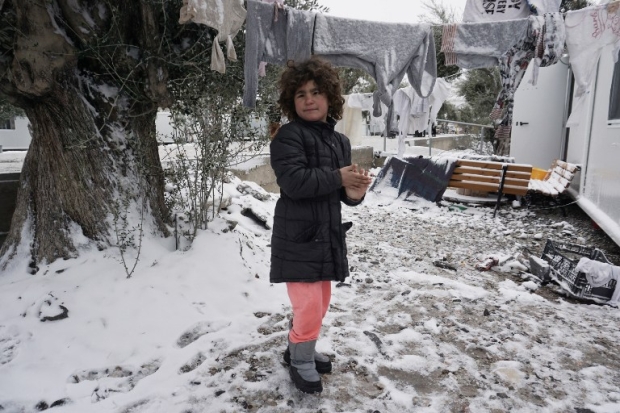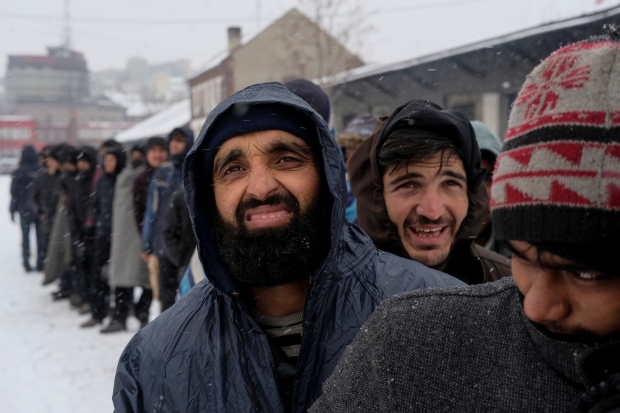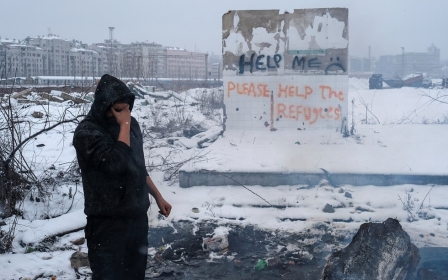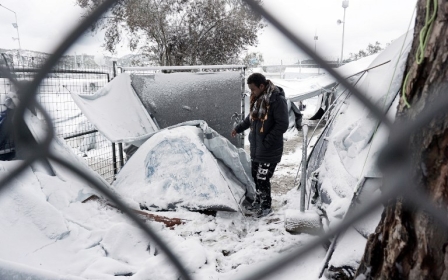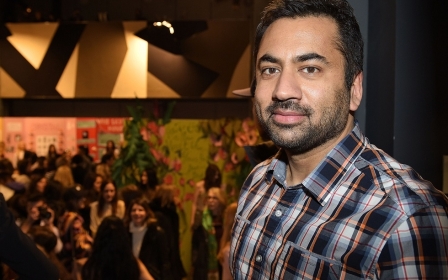Shameful: The EU fails to address the so-called 'refugee crisis'
European soil is not a safe heaven for the thousands of people from the Middle East and North Africa (MENA) region, who have fled war and poverty in their respective home countries and risked their lives to cross the Mediterranean Sea.
European soil is now a cold legal limbo.
The European Union (EU) has shamefully failed to quickly process the status of those who have registered themselves as asylum seekers and applied for international protection.
Consequently, most of these asylum seekers are stranded at overcrowded camps in Greece and Italy. There, they are at high risk of dying from unfavourable weather conditions while they await to be relocated, either to another EU member state or else returned to Turkey under the March 2016 EU-Turkey Statement.
Without urgent EU action, this situation will not improve in the near future. Instead, it will generate more challenges.
The challenge in the south
As part of the European Agenda of Migration, EU countries agreed in September 2015 on a scheme to relocate asylum seekers in Greece and Italy to other EU member states.
'My big concern is that Europe does not have a Plan B to deal with a repeat of the crisis'
- Vincent Cochetel, UNHCR director for Europe
To the disgrace of many who still believe in the EU’s capability to effectively resolve such challenges, the implementation of this scheme has proven slow at best.
According to the latest report from the UNHCR, a total of 7,760 asylum seekers in Greece have already left, or are scheduled to leave, for another EU member state by the end of February 2017. That is around 21 percent of the actual target of 66,400. The total number of relocations from Italy remains at 2,654 - only seven percent of the 39,600 target. And in 2016, only 908 migrants returned to Turkey from Greece under the March 2016 EU-Turkey Statement.
Yet while this measure will contribute to the acceleration of refugees returning to Turkey in future, it does not solve the source of the problem: the necessity of designing a new EU asylum policy.
READ: 'At least in Syria we are still seen as human beings'
Speaking in the European Parliament in early January, UNHCR director for Europe Vincent Cochetel, outlined new proposals for tackling the so-called migrant crisis, and urged the EU to “reshape” its common asylum programme.
“We do not want to see [again] the scenes of 2015 and 2016, but my big concern is that Europe does not have a Plan B to deal with a repeat of the crisis,” he stated.
(I use “the so-called migrant crisis” because the media often refers to this phenomenon as a “migration crisis”. It is actually an unprecedented humanitarian crisis, with an unacceptable human loss. "Migrant crisis" does not describe the gravity of this situation.)
The moral dilemma
Meanwhile in Serbia, where temperatures have fallen to -20°C during the winter, the situation is of acute concern.
Though Serbia has not yet joined the EU, it borders several EU member states, including Hungary and Bulgaria, which have refused entry to migrants.
The so-called refugee crisis has also created problems for debt-laden EU economies, particularly that of Greece
According to recent data from the UNHCR, more than 82 percent of the 7,300 migrants in the country are now accommodated in heated government shelters. However, there are at least 1,200 migrants living in the streets of Belgrade or in makeshift tents at the Serbian-Hungarian border.
As long as EU countries along the western Balkans route do not open their borders, the number of stranded migrants in Serbia will continue to rise, as will the migrants’ demands for the services of smugglers who operate in the area.
It has also posed a moral dilemma: many wonder whether a government with little resources should prioritise the well-being of its citizens, rather than the well-being of its citizens and migrants – to the detriment of the former.
READ: Bring on the refugee crisis in Europe (the Middle East needs it)
At the moment, the Greek government lacks the resources to guarantee the well-being of both its citizens and the migrants stranded on the mainland and islands. Yet this is what Athens is trying to do – with little or no international praise.
Rather, the Greek government has come under fire for its inability to plan ahead of the winter weather. Of course, ensuring adequate reception conditions for migrants in Greece is the responsibility first and foremost for the authorities. Nevertheless, it is a shared responsibility with the EU, which has failed to provide the totality of the assistance it pledged to Greece last year.
Our moral and legal obligations
Human rights group Amnesty International is urging people to sign an online petition “Stop Refugees Freezing to Death in Greece”, in an effort to encourage the European Commission to take immediate action and prevent further loss of life.
This is just one example – of many – of a non-profit organisation attempting to trigger the design and implementation of short-term measures to guarantee the well-being of stranded migrants on the Greek islands, where heavy snow has exacerbated the already sub-standard conditions for thousands of people.
Hopefully, the EU will soon focus its efforts on helping Greece quickly transfer those on freezing, snowbound islands to the mainland
Hopefully, the EU will soon focus its efforts on helping Greece quickly transfer those on freezing, snowbound islands to the mainland, where conditions are slightly better according to non-profit organisations working on the ground.
As Germany plans to start sending newly arrived migrants on its territory back to Greece, effectively reversing a five-year suspension of such transfers owing to the poor conditions there, we Europeans should ask ourselves about our moral and legal obligations to these migrants, and the countries that are currently hosting them.
Is it morally acceptable for some of the poorest states in the Mashriq region of the Middle East and the southern EU to bear the brunt of hosting refugee populations?
- Tania Ildefonso Ocampos is a Spanish political analyst who specialises in EU strategy in the Middle East. She is a former Schuman trainee (Euro-Med and Middle East Unit of the European Parliament's Directorate-General for External Policies), and holds an MA in Middle Eastern History from Tel Aviv University, Israel.
The views expressed in this article belong to the author and do not necessarily reflect the editorial policy of Middle East Eye.
Photo: A refugee stands outside a derelict factory in Belgrade, Serbia on 18 January 2017 (Reuters)
New MEE newsletter: Jerusalem Dispatch
Sign up to get the latest insights and analysis on Israel-Palestine, alongside Turkey Unpacked and other MEE newsletters
Middle East Eye delivers independent and unrivalled coverage and analysis of the Middle East, North Africa and beyond. To learn more about republishing this content and the associated fees, please fill out this form. More about MEE can be found here.



